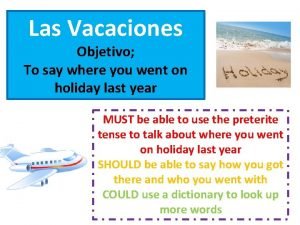SPANISH HIGH SCHOOL SPANISH II What Did You

- Slides: 1

SPANISH HIGH SCHOOL SPANISH II What Did You Do? Imperfect Capítulo 4 Los Perros Olímpicos Content Vocabulary: Mini Cuento Vocabulary Preterite Clue Words Imperfect Clue Words Preterite Essential Learning Concepts: • R 1. 1 Identify main ideas in developmentally appropriate oral/visual narratives based on familiar themes and highly predictable contexts with visual or graphic support. • R 2. 1 Identify people and objects in their environment or from other school subjects, based on oral and written description. • R 2. 2 Recognize that cognates and previously learned structures enhance comprehension of spoken and written language. • R 2. 3 Identify and appreciate differences in cultural perspectives within a defined range of topics (defined by the curriculum). Use simple sentences on very familiar topics to write: • W 5. 1. a explanations of products and/or practices of their own culture to peers in the target language. • W 5. 1. b short notes, messages and brief reports about themselves, people and things in their environment. • W 5. 1. c illustrated stories about activities or events in their environment. • W 6. 1 Produce written and spoken messages such as short notes, messages, stories or reports about people and things in their environment using a variety of media, including print and digital tools. • W 6. 2 Make corrections and edit work when receiving feedback from teacher or peer. • W 7. 1 Explain a local or global practice, product, or issue. • W 7. 2 Utilize one or two credible sources, skimming and scanning websites, to create surveys or complete graphic organizers. • W 7. 3 Identify key details to support an opinion. • W 8. 1 Write using a limited range of vocabulary on previously studied topics. • W 8. 2 Write a response to video or text prompts. • W 8. 3 Research, organize, and present a topic given an outline, template, or graphic source. • SL 9. 1 During highly predictable interactions on very familiar topics, communicate by using basic statements. Communication often requires support from others to maintain the conversation and obtain comprehensibility. Demonstrate limited awareness of and imitate some culturally-appropriate behaviors. • SL 9. 2 Shares likes and dislikes in conversation with others. • SL 9. 3 Give and follow simple instructions to participate in meaningful activities within and across cultures. • SL 9. 4 Ask and answer questions about topics, such as family, school events, and celebrations in person or via letters, email and multimedia. • SL 9. 5 Collaborate to solve simple real life problems. • SL 9. 6 Interpret visual or auditory cues of the target language, such as gestures or intonation. • SL 10. 1 Communicate one’s message when presenting rehearsed material on familiar topics. • SL 10. 2 Present with a variety of media, including digital media or visual displays, short oral messages or reports on familiar people. Places, things or events in their community. • SL 10. 3 Develop a simple presentation on familiar topics keeping audience, context, and purpose in mind. • L 11. 1 – Demonstrate command of conventions of standard grammar and usage; demonstrate command of conventions of standard capitalization, punctuation, and spelling. • L 11. 2 – Apply knowledge of how language functions in different contexts. • L 11. 3 – Use of context clues, analyze meaningful word parts, consult reference materials; demonstrate understanding figurative, word relationships, nuances; acquire and use range of academic and domain-specific words/phrases.

